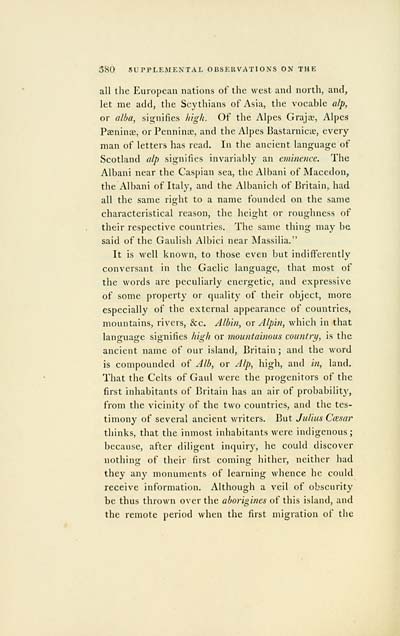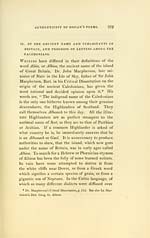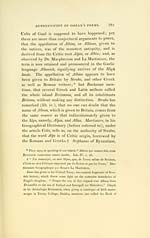J. F. Campbell Collection > Poems of Ossian > Volume 3
(392)
Download files
Complete book:
Individual page:
Thumbnail gallery: Grid view | List view

3S0 SUPPLKMENTAL OBSERVATIONS ON THE
all tlie European nations of the west and north, and,
let me add, the Scythians of Asia, the vocable alp,
or alba, signifies ìiigh. Of the Alpes Grajs, Alpes
Pseninee, or PenniniE, and the Alpes Bastarnicie, every
nian of letters has read. In the ancient language of
Scotland alp signifies invariably an eminence. The
Albani near the Caspian sea, the Albani of Macedon,
the Albani of Italy, and the Albanich of Britain, had
all the same right to a name founded on the same
characteristical reason, the height or roughness of
their respective countries. The same thing niay be
said of tlie Gaulish Albici near MassiHa."
It is well known, to those even but indifferently
conversant in the Gaelic language, that most of
the words are peculiarly energetic, and expressive
of some property or quality of their object, more
especially of the external appearance of countries,
niountains, rivers, &c. Albin, or Alpin, which in that
language signifies ìiigh or mountainous country, is the
ancient name of our island, Britain ; and the word
is compounded of Alb, or Alp, high, and in, land.
That the Celts of Gaul were the progenitors of the
first inhabitants of Britain has an air of probability,
from the vicinity of the two countries, and the tes-
timony of several ancient writers. But Julius Ccesai'
thinks, that the inmost inhabitants were indigenous;
because, after diligent inquiry, he could discover
nothing of their first coming liither, neithcr had
they any monuments of learning whence he could
receive information. Although a veil of obscurity
be thus thrown over the aborigines of this island, and
the remote period when the first migration of thc
all tlie European nations of the west and north, and,
let me add, the Scythians of Asia, the vocable alp,
or alba, signifies ìiigh. Of the Alpes Grajs, Alpes
Pseninee, or PenniniE, and the Alpes Bastarnicie, every
nian of letters has read. In the ancient language of
Scotland alp signifies invariably an eminence. The
Albani near the Caspian sea, the Albani of Macedon,
the Albani of Italy, and the Albanich of Britain, had
all the same right to a name founded on the same
characteristical reason, the height or roughness of
their respective countries. The same thing niay be
said of tlie Gaulish Albici near MassiHa."
It is well known, to those even but indifferently
conversant in the Gaelic language, that most of
the words are peculiarly energetic, and expressive
of some property or quality of their object, more
especially of the external appearance of countries,
niountains, rivers, &c. Albin, or Alpin, which in that
language signifies ìiigh or mountainous country, is the
ancient name of our island, Britain ; and the word
is compounded of Alb, or Alp, high, and in, land.
That the Celts of Gaul were the progenitors of the
first inhabitants of Britain has an air of probability,
from the vicinity of the two countries, and the tes-
timony of several ancient writers. But Julius Ccesai'
thinks, that the inmost inhabitants were indigenous;
because, after diligent inquiry, he could discover
nothing of their first coming liither, neithcr had
they any monuments of learning whence he could
receive information. Although a veil of obscurity
be thus thrown over the aborigines of this island, and
the remote period when the first migration of thc
Set display mode to: Large image | Transcription
Images and transcriptions on this page, including medium image downloads, may be used under the Creative Commons Attribution 4.0 International Licence unless otherwise stated. ![]()
| Early Gaelic Book Collections > J. F. Campbell Collection > Poems of Ossian > Volume 3 > (392) |
|---|
| Permanent URL | https://digital.nls.uk/81286456 |
|---|
| Description | Vol. III. |
|---|---|
| Shelfmark | Cam.1.b.5 |
| Additional NLS resources: | |
| Attribution and copyright: |
|
| Description | Volumes from a collection of 610 books rich in Highland folklore, Ossianic literature and other Celtic subjects. Many of the books annotated by John Francis Campbell of Islay, who assembled the collection. |
|---|
| Description | Selected items from five 'Special and Named Printed Collections'. Includes books in Gaelic and other Celtic languages, works about the Gaels, their languages, literature, culture and history. |
|---|

